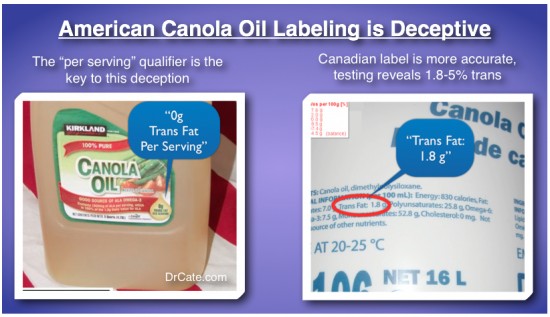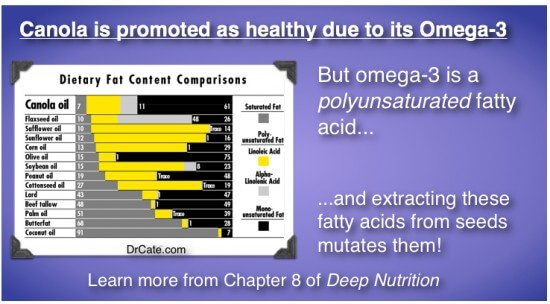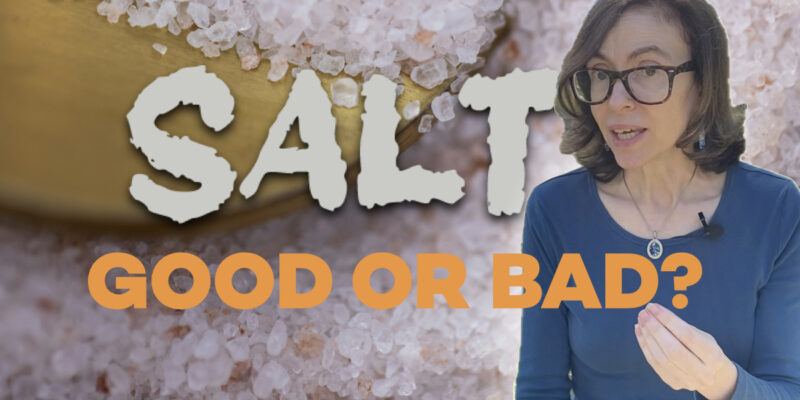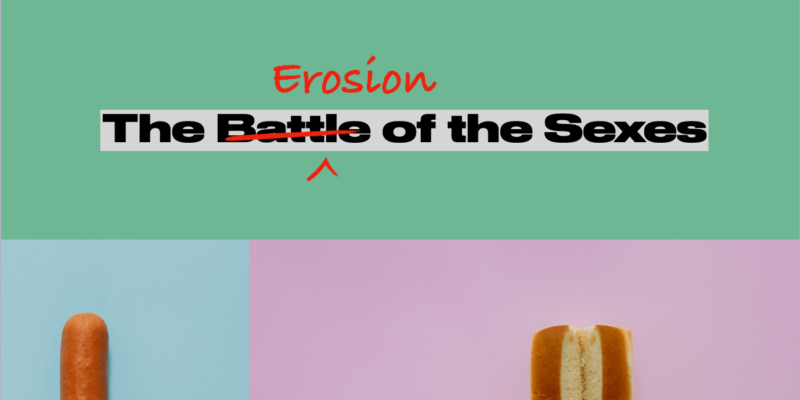If you're a health professional you should know that you can't implicitly trust medical news outlets. They may be manipulating you!

Canola Oil: The blob that ate butter, olive oil, coconut oil and peanut oil threatens American cuisine
The Canola Blob ~ Too Much PUFA in Our Food Puts Too Much PUFA in Our Body Fat
(As published in the Napa Register)
Today I need to make the following emergency public service announcement:
The restaurant world has been taken hostage—by Canola oil!
Over the past several months, Luke and I have eaten out at all sorts of restaurants here in the Napa Valley, from Mexican to Thai, from Chinese to French, from Italian to Fusion. And we’ve discovered there’s one thing nearly every meal had in common.

This article is continued below...(scroll down)
Canola oil.
This week, Cate and I celebrated our wedding anniversary, so we decided to go for a special night out. A friend recommended a place in the next valley over, so we took the drive in hopes that this quaint little eatery might provide a temporary shelter from the relentless Canola downpour. Maybe, just maybe, we wouldn’t be offered yet another menu built on the viscous foundation of this “neutral” oil.
But alas, like a breached tanker foundering on a reef, our hopes were dashed.
Scribbled upon the chalkboard hanging above the service window was the plat du jour:
First up, Belgian Endive Mixed Greens drenched in a Canola oil Vinaigrette.
For the main course, Apricot Couscous, Braised Greens, and a Saffron Braised Moroccan Chicken marinated in Canola oil slowly braised in a Canola oil sauce.
I would go on, but I can almost feel my laptop keys getting slippery. Many modern-day restaurants—even higher priced restaurants; our bill with tip came to just under a hundred bucks—are now essentially purveyors of Canola. That means if you go out to eat on a regular basis there’s a good chance that one-forth to one-third (or more) of the calories in your diet now come from the Canola oil used in the recipes.
So what’s the problem? Canola’s good for you, right? Just ask your server; they’ll tell you. (I’m serious, ask them, and witness them leap to the defense of this ubiquitous food product as if they just bought stock in the stuff.)
Here’s list of our favorite sales pitches for the promiscuous use of Canola:
- “It’s got a high smoke point!”
- “No one’s allergic to it, like with peanut oil.”
- “It’s not animal fat, so vegans can still order fries!”
- “It’s not just pure Canola. It’s a blend.”
- “The chefs like it for its neutral flavor.”
- “It’s cheap!”
- “It’s heart healthy!”
The first six statements are fairly innocuous. But the claim that Canola (a rapeseed cultivar developed in the early 1970s) is “heart healthy” is not only untrue, it is almost universally rejected by the world’s leading lipid researchers.
Why Butter is Better (And olive oil, and peanut oil….)
PUFAs oxidize in the factory during refining, creating from 2-5% trans and other distorted, toxic fats. (See Chapter 7 of Deep Nutrition) When you cook with them, more trans fats form, thanks to a process called the Free-Radical cascade. All biochemistry professors understand this, however too few health professionals have any clue about the health hazards associated with consumption of refined vegetable oils.
The preponderance of current evidence suggests that Canola oil is a trans-rich toxin that, perhaps more than any other single component of the modern American diet, has contributed to increases in cardiovascular disease, metabolic disfunction, ED, stroke, dementia, and a long list of other familiar diseases.
Among the experts in lipid peroxidation, this is no longer controversial: Canola oil is death in a bottle.
You might recall how, several years ago, the New York City Board of Health banned the use of all but small amounts of artificial trans fats in the city’s restaurants. Soon after, Governor Shwarzenegger signed a similar restaurant bill terminating trans in California.
Trans fat, or “trans” for short, is a misshapen molecule that, once consumed, binds to your body’s enzymes in such a way that the enzymes cannot release them. The enzymes mistake the trans for natural fats, and once they pick them up they can’t let them go. That’s what makes trans so unhealthy.
But just a second, you might be thinking, Canola doesn’t contain trans fats, does it? I mean, they’d have to say so on the bottle, wouldn’t they?
Yes, they would, if they were selling the Canola oil north of the border, in Canada. Here in the US, there is no such labeling requirement, so most consumers never learn that their bottle of “heart healthy” Canola contains as much as 5% trans fat, a percentage that goes way up when Canola is heated during cooking.
And since most people don’t happen to have PhDs in biochemistry, consumers don’t realize that the trans fat content is just the tip of the toxic iceberg. Trans fats are a predictable molecular product of Canola oil processing. It’s the unpredictable, randomly mutated molecular configurations that are making so many people sick.

Free Radical Damage
These other distorted molecules—trans’ entourage of nasty thugs—react with oxygen and iron in the bloodstream to create a barrage of free radicals. These free radicals beget more free radical formation, creating “free radical cascades” that, like radioactive energy, can be absorbed by every cell in your body, creating tissue damage and frying your arteries.
How did all this trans and other distorted molecules wind up in Canola oil? From extraction and processing, that’s how. Ironically, the Canola oil that sits in the Canola seed is just fine, even healthy, as it is high in essential omega-3 fatty acids.
The processed Canola oil—extracted with heat and high pressure and the use of harsh solvents, like hexane—is, chemically speaking, an entirely different animal, a substance rendered so rancid you’d think it would stink.
That’s where the “bleaching” and deodorizing come in.
I understand that this is a lot to swallow. So for now, suffice it to say that, if you’re serious about protecting your longterm health, you might want to look into the facts surrounding this now ubiquitous oil, because it’s everywhere, and not just in the restaurants. It’s in salad dressings, olive oil blends, and so-called health foods like grandola. Heck, they’re even coating dried blueberries with the stuff.
Don’t believe me? Take my challenge: See if you can go one week without consuming Canola oil. Check the labels on the foods in the store, and gently compel your waiter or waitress to tell you about Canola oil in your restaurant order (tell them Canola gives you heartburn).
The first five people to go a week without eating Canola will win a free copy of my book, Food Rules.
How to claim your prize:
- In a comment box below, post the name(s) of restaurants in the Napa Valley you found Canola-free food, and be sure to tell us if you had to make any special requests.
- In a separate comment box, share with us a brief description of what you eat when not at restaurants.
- You may use more than one box if needed (we’ve got a 500 character limit and our web team is on leave at the moment)
- Dr Cate.com will contact the first five qualified entrants by email to arrange pickup of your free book!
- May the healthiest Napan win!
Related Posts
List of vegetable oils and video discussion on why they’re bad: https://drcate.com/vegetable-oil-is-everywhere/
How Canola and other vegetable oils ruin a healthy salad: https://drcate.com/salad-dressing-the-silent-killer/
How Canola and other vegetable oils contribute to intestinal inflammation gluten intolerance: https://drcate.com/what-is-celiac-disease-a-recipe-for-recovery-beyond-gluten-free/
I don’t endorse products lightly, but I was honored to be part of Sean Croxton’s Paleo Summit and put together a video that describes why I call cholesterol pills the “gateway drug” into the medical system. The video is part of a package available here: http://paleosummit.com/order/
Please note: Please do not share personal medical information in a comment on our posts. It will be deleted due to HIPAA regulations.
This Post Has 115 Comments
Comments are closed.
Note: Please do not share personal information with a medical question in our comment section. Comments containing this content will be deleted due to HIPAA regulations.



















Hi Dr. Cate, I’m wondering if *unrefined* canola oil is safe and healthy to eat? The way I understand it, is that the refining process Itself causes the formation of the Trans fat particle. Could any of the ‘hateful 8’ oils be safely consumed if they where unrefined?
Yes, BUT! …Once you get to the point of having insulin resistance, your body burden of PUFA is too high. This is explained in the FATBURN Fix if you’re wanting to understand.
[…] Pre-made dressings are filled with preservatives and vegetable oils. Vegetable/canola oils are full of free radicals that cause serious damage to your cells, meaning that your salad has become nearly as harmful to your health as those french fries you really want to eat instead. Learn more at my favorite doctor’s website here. […]
[…] Oil – I’m begging you… please throw away those harmful vegetable/canola oils in your pantry and buy this next time you are at the grocery store. I have replaced all oils in […]
[…] I grew up in the ’80′s, and like many families of that time we replaced all butter in our house with margarine substitutes – in the forms of spreads, sticks and sprays. We were following the dietary advice of the time, which promised us lean bodies, long term health and reduced risk of heart disease. Unfortunately, this information was incorrect and based on inaccurate science. Saturated fat, like butter, in it’s natural form is a health tonic. In fact, primary culprits of promoting systemic inflammation and heart disease are vegetable oils that are in – you guessed it! – butter substitutes and margarine (for more info on that, click here). […]
[…] Nutrition. For information on why these harmful fats are never revealed on infant formula, read this post. And to make sure your healthy dinner salad won’t contaminate your own breastmilk wil trans fat, […]
Dr Cate,
I was wondering why peanut oil is safe to use when it does indeed contain PUFAs? i recently switched my family over to peanut oil, but then came across its nutrition facts on the following website: http://www.fatsecret.com/calories-nutrition/usda/peanut-oil
The company of peanut oil I am using is Planters 100% peanut oil. Your advice is greatly appreciated!
All I have to say is, thank goodness for canola oil! It’s all I cook with at home and we will only eat at restaurants that use it. You see, my toddler has peanut, soy, dairy, and egg allergies. No family restaurant is going to spring for olive oil, so that leaves canola oil. It’s frightening that restaurants might even *consider* using peanut oil, considering how many people it could send into anaphylaxis.
Here is my Canola Oil experience. I am a young, healthy 20 something. I started becoming very sick after eating to the point of food would go in one end and out the other within 10 minutes. This went on for over 2 years. I finally went in for a colonoscopy and the results were clear. I was told by my Dr that nothing was wrong with me and that I had a “nervous colon”. I went on the BRAT diet and my symptoms cleared up immediately.. I slowly started integrating new food and figured Granola bars would be ok. About 10 minutes after eating it I knew it was something in the Granola bar. I checked the ingredients: Whole Grain Oats, Sugar, Canola Oil, Bingo! I was eating oatmeal and sugar prior with no symptoms so I was able to rule them out. This stuff makes me so sick that even a minuscule amount (I accidentally ate one Canola laden croûton and that was all it took) causes explosive diarrhea with large amounts of mucous (sorry TMI). I can no longer go out to eat or eat the majority of processed foods which has been a blessing and a curse. Dont eat this Soylent Green like product, you have been warned….
I don’t eat any vegetable oil at all since I read Deep Nutrition, but I was alarmed to learn that the extra virgin olive oil I buy could be tainted with vegetable oil. I haven’t yet read the book, but in Extra Virginity: The Sublime and Scandalous World of Olive Oil the author apparently illustrates how olive oil producers in the Mediterranean cut their olive oil with vegetable oil because it’s cheaper. Something like 70% of the olive oil on our store shelves has vegetable oil in it apparently. Like I said, I haven’t yet read the book (going to the library tomorrow to check it out), but this is alarming if it’s true. Do you know anything about this at all?
At one point in time it was cut with hazelnut because it has a similar fatty acid profile and actually I don’t think it would be terribly bad for us, however if people couldn’t taste the difference that suggests a potential problem. Taste usually does not lie. But if it’s now being cut with vegetable oil that’s worse for sure. Again, the best bet is to taste and then maybe you could try to get your money back.
Dr. Cate, my grandmother always used lard for cooking. Can you comment on it? I just noticed it is not in your list.
Hi Dr. Cate, I have just read your book for an article I am writing on good and bad oils. You say peanut oil is good but I cannot find any explanation for how good, and for what uses. I understand it has a high smoke point, so I am assuming for cooking it is okay, what about eating? and organic cold-pressed is best? Also, you mention above that avocado oil is good. can it be used in cooking? thanks I enjoyed your book Deep Nutrition
You got it right on all counts about peanut oil. And yes, avo oil is good for cooking. It’s all based on the percentage of MUFAs, PUFAs, and Sat fats as well as how gently it’s processed.
Canola, soy and/or sunflower oils are listed as ingredients in many Whole Foods-branded and stocked products. Recently diagnosed with a laundry list of food sensitivities, I now read labels top to bottom. Most of their 365 products and their olive bar/deli/hot products contain one or a combination of these. I see these offenders in almost every type of packaged food, from snacks to marinades and condiments to soups (even some simple broths) and beyond, so I recommend checking labels. Be alert–they’ll slip it past you.
[…] Canola stands for all toxic industrial oils.) I avoid the stuff at all costs. And if you’ve followed my blog or read any of my books you know I think you would do well to do the same. In fact, along with […]
I used to buy a supermarket flax oil, which I now assume to be “refined’. It was sold as being virgin and cold-pressed organic. I am trying an unrefined organic product, which produces much different results in my bowel movements. The info on the bottle of the more recent purchase says it is ‘unrefined’, and has a nutty taste. It certainly is a different product, because it produces different results; much more benefical!
I place 6 tablespoons of non-fat yoghurt in a bowl, and then 3 tablespoons of the flax oil and blend them with a hand whisker for a few minutes. It is said that a new food is produced which is a cancer preventative. I began to use it a few ears ago, in response to a series of traumas I experienced. It was discovered by Dr. Johanna Budwig in Germany, back in the thirties. Traumas are said to induce a ‘cancer’ response, so I set about to use it as a preventative food.
Dr. Cate,
I’m familiar with the good oils and bad oils that you note in Deep Nutrition. One more question…I’ve been frying our foods in extra virgin olive oil…am I using this oil incorrectly? Essentially, should I go for an olive oil that is from a second press with a higher smoke point? If you could clarify this you would put my mind at ease :). Thanks so much!
Andrea Scherer
Minnesota
The smoke point is only a concern if you actually burn your food. The oil oxidation issue can occur independently. Health-wise, you are always better off with a higher quality oil that has more antioxidants.
[…] also avoid vegetable oils like canola, corn, sunflower and safflower, so I use olive oil instead of vegetable oil for […]
Dear Dr Cate. We are a producer of Canola Oil in South Africa. We take great pride in the fact that both the Cancer Association of South Africa and the Heart and stroke foundation of South Africa fully endorse our Canola Oil. It is a scientific fact that: 1) Canola has the lowest saturated fat content of all commercially produced oils, 2) Canola Oil has a very high Omega 3 content (10%) and also is very high in Monounsaturated fats (61%), Canola Oil is also naturally cholesterol free. We would like to take the opportunity to invite you and all other sceptics to visit our factory and learn more about other amazing facts of Canola Oil. Looking forward to meeting you! Kind regards, The B-well Canola Oil Team.
Dr. Cate, I enjoyed your presentation for Real Food Summit. I want to buy the salute sante grapeseed oil but need clarification on what type to buy. If I understand correctly, I should be their extra-virgin cold pressed oil or is their plain grape seed oil also okay. I was confused because the presentation slide showed the plain grape seed oil can, but I know you said cold-pressed in response to us asking the “5 questions” in evaluating what to eat. Thanks so much!
oops I meant to say “buy their extra-virgin cold pressed oil” not “be”. LOL
Thanks!
Great article Drs L&C!!
I have a PUFA specific question – is it just the oils that we need to be dilligent to stay away from?
I have chronic pain in my hands and wrists from transcription of nearly 20 years, and the *only* thing that has really been superbly helpful has been consuming 2 ounces of hemp hearts a day. I eat them raw and dont heat them, and know they arent heated in processing, but still.
If they are going to fry my arteries, I might need to search even further for my pain relief!
Thank you so much!
BL!
Good article. I am allergic to Canola and avoid it like a plague in the US. Interestingly, a site called http://www.cantola.com has sprung up out there.
Currently visiting Ireland, and there is a national dalliance with Rapeseed oil, pushed by, of course, the Irish agri-business. It is very hard to avoid this oil in the pubs in Ireland, given that the bulk of Irish restaurants are pubs.
If possible, it would be great to have a short, direct page that can be printed out that spells out how unhealthy canola oil is. I’d love to distribute it to every Whole Foods and restaurant in my area.
You could make copies of pages 12 and 13 of Food Rules: Rule 2 Avoid Vegetable Oils. It provides a quick list of reasons why and a summary of all the bad oils.
Having read Deep Nutrition (which I love by the way) I was under the impression that there was no way at all to extract vegetable oils from seeds without using heat (other than the old-fashioned wedge press that you mentioned), but what about cold-pressed vegetable oils? I stick with the stable fats you talk about in the book when it comes to cooking, but I’m trying to make a case for this perspective with some not-so-convinced family members!
Cold pressed is the same as the expeller pressed. On page 180 there’s a reference you might find useful for the fact that expeller pressed canola bottles test at up to 5% trans, which multiplies when you cook with it.
Thanks! That’s helpful.
I love Dr. Cate’s emails and wish was still in NH. I saw her once for a sprained ankle, then heard her at a wound conference discussing nutrition for healing… wish I could pick her brain more. I always wondered about canola oil since noticing a rancid smell/taste in almost every product than contains canola especially when the product is getting old. I stick to olive oil, coconut oil and butter and they actually have taste! Thank you Dr. Cate!!
Um, did anyone win the contest? Anyone find a restaurant in Napa Valley that does not use canola oil?
I contacted my favorite French restaurant but have not heard back 🙁
And shame on The Culinary Institute of America in St. Helena for promoting the use of canola oil in restaurants. Restaurants should smell good and stimulate your appetite. Instead, with the widespread use of vegetable oils in restaurants, they often smell awful.
I suspect nobody had any luck. I hope that the new leadership coming to the CIA can turn the ship around. Not just for Napa, but for all the restaurants who look to the CIA for inspiration, leadershiop and education.
One thing you forgot…95% of Canola oil is Gen Modified! SOOO unhealthy.
Is Sesame oil a good alternative?
Unrefined sesame oil would be best.
Dr. Cate,
Do dehydrated foods count as raw? Would making a bunch of organic jerky be a good way to get in raw meat?
No. The drying alters the molecules in ways that make them less bio-active. Still, jerky is a great fast food.
Dear Dr. Cate,
Are walnut and macadamia nut oils safe for consumption?
It’s pretty much all about the processing. Canola, even, could be relatively healthy but it’s not b/c of the high heat etc. Assuming we’re talking about good oils, walnut is great for salads but not for cooking and mac nut is great for both. Chapter 8 of Deep Nutrition explains the rationale as well as rules that help you sort it all out.
“The print is too tiny to put on the front”. (facing the customer)
But I noticed some of the print describing grass fed or the farm source were very tiny and turned to the front. Maybe they know that canola oil is not a real selling point. Steering clear of it is a real challenge.
Wow that’s disappointing. Canola in a spice mix. However at that very low concentration it’s not something I would worry much about. Maybe some day you’ll find a better alternative.
I discovered the breakfast sausages I ordered from the Whole Foods meat department contained canola oil. I looked at all the many varieties of sausages in the glass case and none of them indicated canola oil – even the breakfast sausages. I asked them if they had – any – sausages that did not have canola oil and this is what they said: “We do not ADD canola oil to our sausages but canola oil may be in the spice mix we use. It’s listed in the ingredients on the BACK of the labels…
I am allergic to canola oil. I know you are not supposed to be, but I go into anaphylactic shock when ingested. Yes it is possible to eat out, but very difficult. Sometimes we visit several different restaurants before finding a safe one. We live in the countryside, so I do not eat out often. One of my big concerns, is that the FDA does not feel it necessary to tell the US public, that canola is made from the rapeseed plant.
Dr. Cate,
How does all this apply to topical skincare? If we use a quality cold-pressed oil (like almond or rose hip seed oil) high in polyunsaturates, would those then become part of our cellular membranes upon absorption, and then react with sunlight to oxidize and increase the chance of age spots and photodamage? I’m thinking that for skincare too we should stick to monounsaturated fats and saturated, but the beneficial properties of various nut and seed oils are frequently touted.
Thanks!
It’s all about the quality of the oil. PUFAs of high quality will retain the antioxidants and this includes vitamin E. Mono- and saturated fatty acids do not need as many antioxidants b/c of their inherent stability.
Dr.Cate,
In your book Deep Nutrition, and here, you suggested peanut oil as a substitute but almost all peanut oil in the US is refined. What are the transfat risks of cooking/frying with refined peanut oil?
The trans fat content is related to the extent of processing of all oils, including olive oil, and the inherent fatty acid profile. The lower grade peanut oils will be worse for us than higher grade. Since the grade and quality of most peanut oils is not clearly marked, we have to use our taste buds to guide us. More peanut-y flavor is better.
Hi Dr Cate,
I was wondering what your opinion of Rice Bran Oil is – it seems to be promoted as one of the healthier newer oils around now, with a high smoke point. I asked this question under your post about wheat, by mistake, and then found this post – sorry about that.
Rice Bran is high in polyunsaturates and those fatty acids are quickly damaged under high heat. I recommend you consider starting with Chapter 8: Good Fats and Bad, to clear up the issue once and for all (that’s our hope, anyway!)
Hi Dr. Cate
I loved your book ‘Deep Nutrition’. I go back to it for reference quite a bit because there is so much to take in! Something interesting about fats, in Ireland I found out that the farmers there cultured their butter first. It has a completely different flavour from creamery butter! Would there be a major nutritional difference? Which would be better to use?
Cultured butter would have a different flavor and perhaps slightly better nutrition. If the farmers in Ireland are culturing unpasteurized butter, they’re using the creme de la creme for butter–saving the top level cream from a day or two’s milkings and allowing it to sour naturally by the action of bacteria.
Why does the American public accept the lack of specificity when it comes to fat/oil? When we go to a restaurant, no one would accept a menu that simply stated “meat” or “fowl” instead of steak – even the cut of steak – or chicken, duck, etc. Same is true for carbs- no one would accept fruit pie – they’d want to know whether it’s strawberries, apple or pumpkin, etc. Fats are a critical component of the diet yet people act like you’re an extremist if you want to know exactly what you’re eating.
That is a great point. I do feel idiotic if I ask about cooking or salad oils at restaurants.
I’m on the Central Coast in CA and did just that, no canola, no soy, no sugar for 2.5 weeks while doing a gut healing program a couple of years ago. Talk about hard! We basically didn’t eat out except for sushi occasionally. It’s frustrating when at our local health food store canola is added to just about every sausage in their case. I’ve asked numerous times why and never get a good answer. I just keep asking. Maybe they’ll listen one day.
They add Canola to sausage?!! OMG that is horrifying.
Seems like we should err on the side of ease of access for our hunter-gatherer ancestors. Lard, butter, bacon fat, coconut oil – EASY. Canola (or, more accurately, rapeseed), corn, soy, sunflower, grapeseed oil – DIFFICULT. The easy fats are what we have evolved to eat, the seed oils requiring industrial presses would not have been possible for our ancestors and thus we don’t have metabolic adaptation for them. I always viewed pesticides the same way. Just not stuff we’ve evolved with.
my husband and i do not like the taste of canola oil or “vegetable” oil (which is usually mostly canola)… we use peanut oil, olive oil (of course) and also sunflower oil 🙂 thanks for your very informative article. we also don’t like to use palm oil (VERY common in your processed foods) because of where it comes from… i read an article in the National Geographic about how Borneo is being clear cut and replaced with palm trees and how it is really bad for the whole ecosystem.
Sunflower is actually not that great, Im sorry to say, b/c it suffers from the same sorts of processing pitfalls as canola. Deep Nutrition chapter 8 entitled Good Fats and Bad describes these pitfalls.
The one thing that confused me in your book and blog is your use of peanut oil. Isn’t peanut oil very high in omega-6’s and also, aflatoxins in peanut butter are toxic and carcinogenic and there’s TONS of omega-6 in peanut oil. Peanuts contain 4,000 milligrams of omega-6 in each 28 gram, one ounce serving of peanuts and peanut lectin goes into your bloodstream and wreaks havoc, while omega6 PUFAs grace you with additional oxidative stress.
http://www.whfoods.com/genpage.php?tname=nutrientprofile&dbid=114
Don’t forget, omega-6 is a category of essential fatty acid. I am researching symptoms of omega-6 deficiency for a future post on troubleshooting problems w/ Paleo-style diet change.
Most people don’t realize that the fungi that produce aflatoxin grow on crops other than peanuts, including wheat, corn, beans and rice. Not to minimize the importance of the issue; food contamination with fungal products is yet another set of troubles arising from the industrial food chain.
Our family is suspicious of canola, as we are of any large-scaled industrially-produced product, although I’m not convinced that small-scale low-temp expeller-pressed low-erucic acid canola is dangerous. Our staple cooking fats are organic lard and tallow from pastured animals, organic ghee from pastured cows, and organic palm oil and palm kernel oil. We use carefully bottled and preserved organic flax oil and organic extra-virgin olive oil on veggies, salads & low-temp sautes.
Thanks for the great post, you mentioned that when heating Canola oil that it can actually increase the amount of transfat is this true no matter what the extraction process and what kind of increase are we talking about? The bottle at the top says 1.8g so if I cook with it (which I wouldn’t!) how many grams on average would it go up to?
Good question. Depends entirely on details: time, temp, acidity. I’ve read reports showing up to 25% from deep frying.
…parsley seed (Petroselinum crispum), walnaut, Milk thistle (Silybum marianum (L.) Gaertner), pumpkin seed,apricot seed.
All of the oils are supposed to be consumed as unheated. Greetings
The quality of an oil, as with other foods, can be judged by source and tradition. Sounds like your product comes from a family farm, hopefully organic/healthy soil and is manufactured in small batches according to traditional practices. They also advise you to use it traditionally–ie not for cooking.
Chapter 8 of DN, the section entitled “Where Does Vegetable Oil Come From” explains why you don’t need to worry about the PUFAs “going poof” in your bloodstream when the oils are made according to tradition.
…because canola have similar omega 3-6-9 ratio. My concern is trans fat content of this oil. Moreover, does this highly reactive polyunsaturated fats (in other their products) produce free radicals in a chain reaction in my body? What do you recommed (all are cold-pressed unrefined): flax, canola, evening primrose, seet almond, cherry seed,peanut,
hemp,dill, poppy,black cumin (Nigella sativa), wheat germ oil, camelia (Camelina sativa), Black Horehound (Ballota nigra),…
Dear DrCate! what is your opinion about cold-pressed unrefined (uncleared) organic canola (Brassica napus) oil. We have here (Europe) few small family-ruled companies producing very vide range of such oils.These oils have very short expiration date – even 2 months and are delived in theramal insulated boxes. They sell as their staple products flax and canola, claiming that the latter should be consumed as often as vergin olive oil (organic, uncleared, cold pressed is unavailable where I live)..
I’m back from Napa, and there was slim pickings for Canola-free eating. I went to the Oxbow Public Market (tourist-y, I know), and ate at Pica Pica, C Casa, Three Twins Ice Cream, and Hog Island Oysters. Pica Pica and CCasa both use canola oil in their dishes. I only had raw oysters at Hog Island and so assumed there was no canola oil there.
If we have any luck, next time you’ll have more choices.
BTW, we love Hog Island. They proudly say they use ONLY olive oil.
I live in your area in Sonoma County in the city of Santa Rosa. After asking the chef/ server whenever I eat out I have found the use of canoila oil to be everywhere. There are some smaller, tradional places that use olive oil, some of the new higher end use rice oil. I like the Vineyard Inn in kenwood, they’re organic and often biodynamic and they make everything from scratch so you can find something wonderful and healthy. Also, Brody’s is an affordable burger joint with local grass fed.
Great info. Thank you, Kari.
Have you tried Bottega? They use olive oil as well as peanut oil.
I have heard very good things about Bottega. We are also touring the Salute Sante oil production facility this month to learn about their grapeseed production methods.
I think this article speaks too broadly and hence misleads.
Spectrum’s Organic Expeller Pressed Canola oil does not have detectable levels of “trans” isomers or trans fat. Trans fat is a product of how the oil is extracted and stabilized.
http://www.spectrumorganics.com/images/uploads/41b7e33317e6f.pdf
I appreciate the link however I notice your background is not organic chemistry, but rather philosophy.
When it comes to organic chemistry, litte details really matter and as we say in our article, unless you have fairly extensive training you really can get quite confused by what seem to be conflicting claims.
The pdf you cite is published by a company that sells Canola. In my view, that diminishes it’s reliability.
…As does the fact that the pdf contains a serious mistake. Trans isomers are not synonymous with “bio plastics” as they suggest. Trans simply refers to the double bond configuration.
For anyone who is curious about this sort of biochemical detail: Double bonds between hydrocarbon molecules can either assume the trans or the cis configuration. Trans fatty acids tend to occur less in nature, but conjugated linoleic acids do have a trans configuration and are very good for us.
I have a background in economics, mathematics, philosophy, and probability theory and a PhD is the Foundations of Statistical Inference (Stanford, 1982).
Key is that canola oil has no or some trans fat depending how it is extracted and processed.
To denounce it as such is misleading. If your restaurants use a good quality canola oil such as Spectrum’s Organic Expeller Pressed Canola Oil they will not be serving you “death in a bottle.” Fighting words like that may sell books, but defy logic.
I am hardly willing to risk my health, my patients health, or my reputation as a physician, for the chance of making a couple bucks selling a few books.
The reference article we cite in Deep Nutrition states:
Formation of trans fatty acids and cyclic fatty acid monomers was investigated during refining of low erucic acid rapeseed oil. The first steps of the refining process, that is, degumming, neutralization, and bleaching, hardly modified the fatty acid profile. In contrast, deodorization produced substantial quantities of trans fatty acids (>5% of total fatty acids) and small amounts of cyclic fatty acid monomers (650 mg of cyclic fatty acid monomers/kg of oil) when severe conditions (5-6 h at 250 degrees C) were used.
In the seed there’s no trans fat. The process of removing it is the source of the contamination. If you pounded Canola seeds in a wedge press at home, that would be a safer method of producing Canola oil. But on an industrial scale that kind of gentle treatment would not be economically feasible.
Hmmm! What happened to Zeno Swijtink?
I don’t have a background in organic chemistry but it’s not particularly hard to imagine that the degree of processing required to render rapeseed into oil would be very damaging. In your book you made it fairly easy to understand that if an oil is a modern “vegetable” oil it almost certainly is bad. Whatever oil doesn’t surrender itself under old fashioned methods is suspect. Only oils eaten historically by traditional world cultures are to be trusted.
(cont.)
but it lined the pockets of merchants, and launched a whole new era in American eating habits.
So my solution is a simple one. Just roll back the calendar and eat the way my grandparents used to eat, with lots of animal meats and fats, with as little oil as possible. In the past year, I think the only times I’ve used oil were to marinate beef (Chaffin Family Orchards olive oil is perfect for that), and to slow cook mushrooms (they need a little oil to get started).
(cont.)
video of a speech she gave called “The Oiling of America”. In it she describes how Americans were persuaded to give up their animal fats – mainly butter, cream, lard and tallow – and exchange them for vegetable oils, basically as part of a marketing campaign launched by the makers of margarine, Crisco and Wesson oil (citing from memory here, but I think those were the big ones). So once again Americans were sold and bought a bill of goods that was not good for their health, but
Personally, I don’t eat out in restaurants any more or buy prepare foods (not even the “organic” ones) and use very little oil in my home cooking. The little bit of oil that I do use is unfiltered extra virgin olive oil (Chaffin Family Orchards’ is absolutely the best) and extra virgin cold pressed coconut oil. And it really is very easy to practically eliminate oils from one’s diet, just by returning to a traditional American diet. Sally Fallon (from the Weston A. Price Foundation) has an
Even most olive oils used in food prep are actually olive oil/canola oil blends. Always ask to see the container. Asking for olive oil and vinegar for your salads could still result in canola. I was stunned when I saw that my favorite gourmet shop where I ate salad almost daily always holding the dressing and asking for olive oil on the side was a olive oil blend with canola oil, my heart sank, I never use canola on my own and here I was getting it daily and did not know because I assumed. Ugh!!
Good tip: Ask to see the bottle. This little nag would be especially important where you are a regular customer.
Great post Dr. Cate. I’m with you all the way.
What about rancidity in oils? I refrigerate to avoid it. Oils that are heated are far more susceptible. That would include things like coffee, granola and roasted nuts. My stomach hates rancid oils (which is why I started roasting my own coffee) and I’ve heard rancidity is as dangerous or more than the junk oils.
Jeff
There are two kinds of rancidity. Both make foods taste bad, only the second kind makes us feel bad.
“Hydrolytic” rancidity is not bad for us. It’s actually part of our digestive process. It’s the reason fish goes bad so fast and is caused by the release of free fatty acids from their tri-glyceride molecule. It is significantly important in terms of flavor production–Hydrolytic rancidity gives strong cheeses like stilton their sharp burning taste. If you could ask a vulture or other carrion-eater for their opinion they would probably tell you they prefer their fats [hydrolyticaly] rancid.
“Oxidative” rancidity leads to the formation of both unpalatable and toxic compounds. Three distinct classes of substance occurring in oxidized fat have been shown to be toxic:
a) Peroxidized fatty acids (peroxidized fatty acids destroy both vitamin A and E in foods).
b) Polymeric material (under normal food processing conditions these appear in small enough quantities to be insignificant).
c) Oxidized sterols (thought to be involved in the causation of atherosclerotic disease).
What do you recommend for someone like me who travels a lot and has to eat out much of the time? I am based in Napa and can drive a bit but do fly to a lot of destinations. I can start seeking out particular restaurants where I travel as well but don’t know how to discern. I don’t know if there is a list somewhere.
Until there’s a universal Canola-Free-Kitchen symbol above the door on all participating eateries, you and I and anyone else who really wants to eat wel–and by the way enjoy better tasting food (Canola is not “neutral”; it destroys flavor, in my opinion) must be willing to nit pick the poor waitresses.
I have started incorporating a little meat into my lifelong vegetarian diet. I bought some good chicken sausage at our local Whole Foods. I made red potato and chicken sausage soup. It was very good. But I was surprised and haunted by the fact that it had CANOLA as an ingredient! That knowledge ruined what otherwise was a delicious meal.
I just cannot fathom that the otherwise enlightened folks at Whole Foods aren’t aware of Canola’s chemically and genetically dirty and twisted history!
Seriously, even if you one lacks an intimate knowledge of the intricacies of PUFA oxidation, shouldn’t the fact that the biggest bad boys in Agribusiness are behind Canola at least raise an eyebrow?
I’ve been consciously eliminating canola ever since reading your books and talking with you eons ago 🙂 ….
It’s one of the biggest challenges, and so rewarding when you get your point across!
Thanks for the great article and reminder!
Kim
I’ve read your book ‘Deep Nutrition: Why Your Genes Need Traditional Food’. I do so appreciate the honesty of your appraisal of our American diet. Reading your book has further refined what I already knew and added lots that I didn’t know about the human diet and, more specifically, the American diet. I am armed by this knowledge!
I never eat Canola now that I know what it really is. Yes, it is hard to avoid Canola! My Mom clued me in to eat butter years ago. And..I have perfect cholesterol!
What about safflower oil?
Safflower also is a vegetable oil, though not as commonly used as Canola. We list the top 5 vegetable oils to watch for in this little video we did when we lived in Kauai: http://www.youtube.com/embed/MkG90mCr3L8?autoplay=1&hd=1&KeepThis=true&TB_iframe=true&height=370&width=640?autoplay=1&hd=1
Hi everybody.
I was at an event recentl where the featured chef confessed her love of all things Canola. They had a sampling of locally produced grape seed oil on offer, and I gotta say, the one’s I tried tasted pretty darn good—none of the rancidity and artificial flavor of Canola and other veg. oils.
Cate and I will be touring the facility that produced those grape seed oils a couple weeks from now to see how they do things. So stay tuned for the report!
When I’m not eating in restaurants, I eat a lot of soups and stews. I make clear broths with bones and meat. There’s an Asian market that has knees and other joints from pigs, which makes a very nice, flavorful broth. I also eat a lot of pho.
I also am grateful for my slow cooker. I throw in meats and veggies I have along with some bones I save in the freezer. I also eat rice, rice noodles, some eggs, and nuts. Lately the fruits I’ve been enjoying are avocados, tomatos, grapefruit, and oranges
Since you are in the Napa area, please share where you get your pho and the location of the Asian market!
Hi Dr. Cate. I actually don’t live in the Napa area, but my fiance and I are taking a day trip there today. We will sleuth around!
As for pho, being that many of the pho restaurants are mom-and-pop shops, I always feel like I’m questioning my aunts about what’s in their food, and I can’t seem to do it in the pho restaurants without feeling like I’m personally insulting them. Part of this is that it’s not standardized like chain restaurants, so ingredients may change often without notice
Thanks, D. Please do share your discoveries with us!
When it comes to mom and pop pho, Luke and I pho-cus on their broth. They are usually proud to tell you they’re making their own “from scratch” and we ask specifically about bones. Also, we order the pho that uses beef tendon because even if the broth is not from scratch/bones there will be some gelatin.
There’s little opportunity to add Canola to pho–one of the reasons it’s a fave.
Well, I am one of the people who IS allergic to this scourge of the kitchen (despite what the wait staff think!). I had a very violent reaction the first (only) time I tried it and I have been telling people how bad it is ever since. Rapeseed is only fit to be eaten by ruminants an it even makes some of them unwell.
I knew that eliminating canola oil was going to be one of the hardest thing to do when I started being mindful about my food choices. I have recently been diagnosed with several food allergies, and the few restaurants that I can eat in are further reduced because I’m now trying to avoid canola oil as well.
So far, the only restaurant I’ve found in the “Napa area” is not in Napa; it’s in the South Bay of the San Francisco Bay Area in Milpitas called Tayyibaat.
Thanks for the tip.
Our hope is that, as the word gets out, establishments will offer Canola-free choices just as they already offer gluten-free, vegetarian-friendly, and peanut-free.
This article lacks sources. Anyone can make claims with nothing to back them up.
This statement is laughable and just not true:
“Among the experts, this is no longer controversial: Canola oil is death in a bottle.”
I’m glad you have a problem with people making claims with nothing to back them up. That’s exactly what those who say that Canola is a healthy oil are doing and I have a problem with that, too. I back up my statements with over the over 300 references in my book, and 44 citations in the chapter entitled Good Fats and Bad.
And that’s also why I included a photo of a bottle of Canadian Canola versus American.
go dr. cate! we can also apply that to the whole low-fat-is-good-for-you craze wrongly promoted by the government
…and ten million other dietary wrongs
Great Article as always.
What is a good replacement for salad dressing oil if you don’t like the taste of EVOO?
Is there a neutral flavored oil that is good for you? Is light Olive Oil a option?
Thanks!!!
Light olive oil is a pretty good option but it’s the lowest quality olive oil you can get and that means its been processed rather harshly. Better than that would be to match the salad with an oil that you like. For example, peanut for asian themed salads, olive with mediterranean, avocado oil ($$$) for a more citrusy flavor. Don’t forget to use a vinegar that tastes nice, for example, balsamic. That might help you enjoy the flavor of olive oils.
Also, unrefined grapeseed oil offers another taste profile. Luke and I are touring the Salute Sante plant here in Napa and will write up a report on their products, flavors, and how the oil should (and should not) be utilized.
Hi Cate and Luke,
Great article. I’ve been aware of the dangers of canola oil for awhile, but have been struggling with finding a cooking oil alternative. Obviously there’s coconut oil which I use frequently, but sometimes I don’t want the taste of coconut oil infiltrating my food. Does another option exist?
Thanks for the great blog and information!
Tristen
We chose from butter, bacon fat, olive, coconut, and peanut oil depending on the dish.
…and we’ve recently started using Salute Sante grape seed oil made here in Napa.
Isn’t grape seed oil the same as any other seed oil?
Yes. But it is more like flax in that (at least some) producers respect the oil and do every thing they can to prevent its destruction by oxidation. You can tell if your grapeseed is well treated or not by the price and the retention of taste; high cost and more flavor are both indicators of better treated oils.
Not all coconut oils taste of coconut. I like the taste, but I didn’t like the extra virgin organic coconut oil that Wal-Mart sells, because it seemed to have essentially no flavor at all. Might be just the ticket for you, though. Shop around a bit, you might find one you like.
Hope this helps.